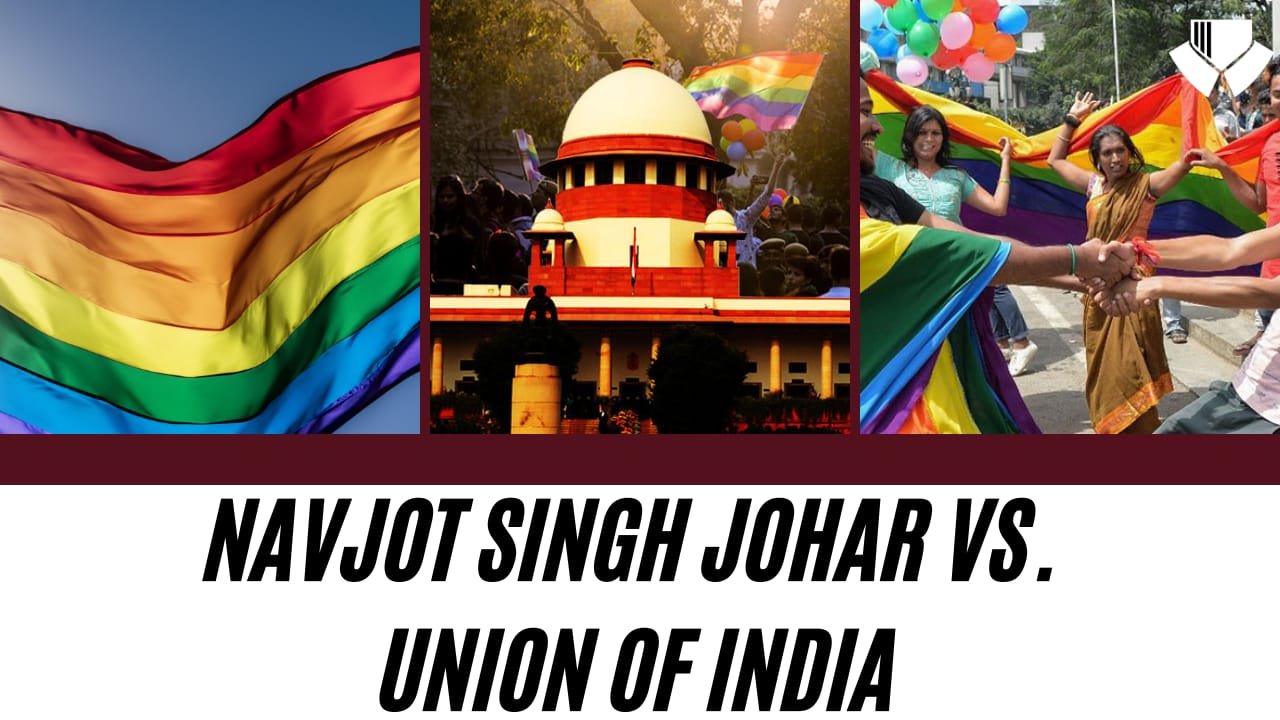This case analysis is done by Sagili Bhavana Sree, A 2nd year law student at Damodaram Sanjivayya National University.
Citation– 2018 INSC 790
Date– 6th September 2018
Judges- Dipak Misra CJI and A.M. Khanwilkar, J.
Petitioner(s)- Navtej singh johar & ors.
Respondents– Union Of India ,Thr. Secretary , Ministry Of Law And Justice
INTRODUCTION
This petition aimed to affirm and safeguard the rights related to sexuality, sexual self-determination, and the choice of sexual partners, all of which are seen as fundamental components of the right to life enshrined in Article 21 of the Indian Constitution. The primary goal of this petition was to declare Section 377 of the Indian Penal Code, a law that criminalizes consensual sexual activities among adults, as unconstitutional. The petitioners argued that various sexual orientations, such as homosexuality and bisexuality, are natural expressions of human diversity. Criminalizing these orientations was viewed as a violation of constitutional principles related to human dignity and privacy.
Taking into consideration these compelling arguments, the Supreme Court issued a ruling that unequivocally recognized the discriminatory impact of Section 377 on the Lesbian, Gay, Bisexual, and Transgender (LGBT) community. In its judgment, the Court emphasized that an individual’s sexual orientation is an inherent and essential aspect of their identity, dignity, and personal autonomy. As a result, the Court concluded that Section 377 not only contravened these core principles but also violated a spectrum of constitutionally protected rights.
First and foremost, the Court found that Section 377 encroached upon the rights to dignity, privacy, and sexual autonomy, all of which are explicitly guaranteed under Article 21 of the Indian Constitution. This decision acknowledged that the criminalization of consensual same-sex relationships compromised the fundamental human dignity of LGBT individuals, infringing upon their privacy and autonomy in matters of personal relationships.
FACTS
- Section 377 of the Indian Penal Code, a law dating back to the colonial era, prohibited “carnal intercourse against the order of nature.” Essentially, this law made consensual sexual activities between adults of the same gender illegal, effectively criminalizing homosexuality in India.
- Navjot Singh Johar and a group of petitioners lodged a legal challenge against the constitutionality of Section 377. Their primary argument revolved around the assertion that this law encroached upon their core constitutional rights, notably their entitlement to equality, privacy, and immunity from discrimination, all of which are protected under the Indian Constitution.
- The Delhi High Court had previously decriminalized consensual homosexual acts in 2009, but the decision was later overturned by the Supreme Court in 2013, which led to the re-criminalization of homosexuality.
ISSUES
The main issues in the case included:
- Whether Section 377 of the Indian Penal Code is unconstitutional?
- Whether the 2013 Supreme Court judgment that recriminalized homosexuality was correct in its interpretation of constitutional principles?
CONTENTIONS OF APPELLANT (PETITIONERS)
The appellants, including Navjot Singh Johar, argued the following:
- Section 377 violated the fundamental rights to equality, privacy, and non-discrimination guaranteed by the Indian Constitution.
- The criminalization of homosexuality had a profound and negative impact on the LGBTQ+ community, leading to stigma, discrimination, and harassment.
- The 2013 Supreme Court judgment was erroneous in its interpretation of constitutional principles and needed to be revisited.
CONTENTIONS OF RESPONDENT (UNION OF INDIA)
The Union of India initially opposed the petition but later changed its stance and did not contest the challenge to Section 377. The government, therefore, did not provide arguments against the petitioners.
JUDGMENT
- On a momentous day, September 6, 2018, the Indian Supreme Court made a historic decision, unanimously rendering Section 377 of the Indian Penal Code partially inoperative. This groundbreaking judgment was a watershed moment for the LGBTQ+ community and human rights in India.
- First and foremost, the judgment acknowledged the discrimination and hardships that the LGBTQ+ community had long endured due to the existence of Section 377. It was a recognition of the long-standing struggle for equality, respect, and the recognition of their basic human rights.
- In its ruling, the Court firmly declared that Section 377 violated the fundamental rights enshrined in the Indian Constitution. It emphasized that the criminalization of consensual homosexual acts was a direct affront to principles of equality, privacy, and protection from discrimination. This pronouncement signified a significant shift towards ensuring that all citizens, regardless of their sexual orientation, were granted equal protection and treatment under the law.
- Furthermore, the judgment highlighted the paramount importance of the right to choose a life partner, an essential facet of an individual’s liberty and dignity. This right was underpinned by Articles 19 and 21 of the Indian Constitution. The Court’s decision resonated with the principles set forth in Shayara Bano vs. Union of India and Ors. (2017), underscoring the unreasonable and arbitrary nature of Section 377. This law had, for far too long, criminalized private, consensual relationships and subjected the LGBTQ+ community to discrimination and unequal treatment. The judgment served as a resounding call for the protection of individual choices and freedoms, reiterating that love knows no boundaries.
- Moreover, the Court invoked the principle “et domus sua cuique est tutissimum refugium,” which translates to “a man’s house is his castle.” This principle was employed to argue that Section 377’s restrictions were excessive and unreasonable, curbing the freedom of expression and personal choice for LGBTQ individuals. It was determined that these restrictions failed to serve the intended purposes of maintaining public order, decency, or morality, and, in fact, infringed upon the rights and autonomy of individuals to lead their lives authentically and in harmony with their true selves.
- In sum, the Supreme Court’s decision in 2018 was a transformative moment in the pursuit of equal rights and social justice for the LGBTQ+ community in India. It marked a significant step toward recognizing their dignity and affirming their place as equal citizens under the law, paving the way for a more inclusive and accepting society.
- The 2013 judgment that had recriminalized homosexuality was overruled, and the Court acknowledged that it had erred in its previous interpretation of constitutional principles.
- The judgment was celebrated as a significant step towards LGBTQ+ rights in India, and it marked the beginning of a more inclusive and accepting legal framework for sexual minorities.
CONCLUSION
Navjot Johar’s case reinforced the idea that societal norms must evolve with the times, and that justice must be dispensed without prejudice or bias. In doing so, it has set the stage for a more inclusive, accepting, and equitable India, where diversity is celebrated, and human rights are upheld, regardless of an individual’s sexual orientation. This judgment is not just a legal landmark; it is a testament to the power of the law to reshape society and protect the inherent rights and dignity of all its citizens.
This judgment reverberated far beyond the courtroom, echoing throughout society and challenging deeply entrenched prejudices and stigmas. By recognizing the LGBTQ+ community’s right to sexual autonomy and choice of partner, the Court affirmed that every individual, regardless of their sexual orientation, is entitled to the fundamental rights enshrined in the Indian Constitution.
The judgment demonstrated the judiciary’s capacity to adapt and correct past errors, as it overruled its own earlier decision in 2013 that had recriminalized homosexuality. It acknowledged that sexual orientation is an inherent and natural aspect of one’s identity and that criminalizing it violated the constitutional guarantees of dignity, privacy, and non-discrimination.


